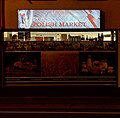- The deli counter of a Polish shop in St Austell, Cornwall
- Refrigerated aisle of a Polish shop
- Fresh pierogi on display behind a deli counter
- Various flours, pickles, fruit preserves, and herbal teas on display
 Frontage of a Polish shop in Forest Hill, of which the Polish name, Jagiełło's Delikatesy, incorporates the English possessive | |
Native name | Polski sklep |
|---|---|
| Company type | Grocers and convenience store |
Area served | British Isles |
| Products | Food and drink |
A Polish shop, also known as a polski sklep, is a type of delicatessen, in the British Isles that retails various types of Polish food products. In 2014 there were estimated to be up to 500 Polish shops in the United Kingdom (UK), [1] their presence is considered to be a prominent symbol of the Polish community. [2]














